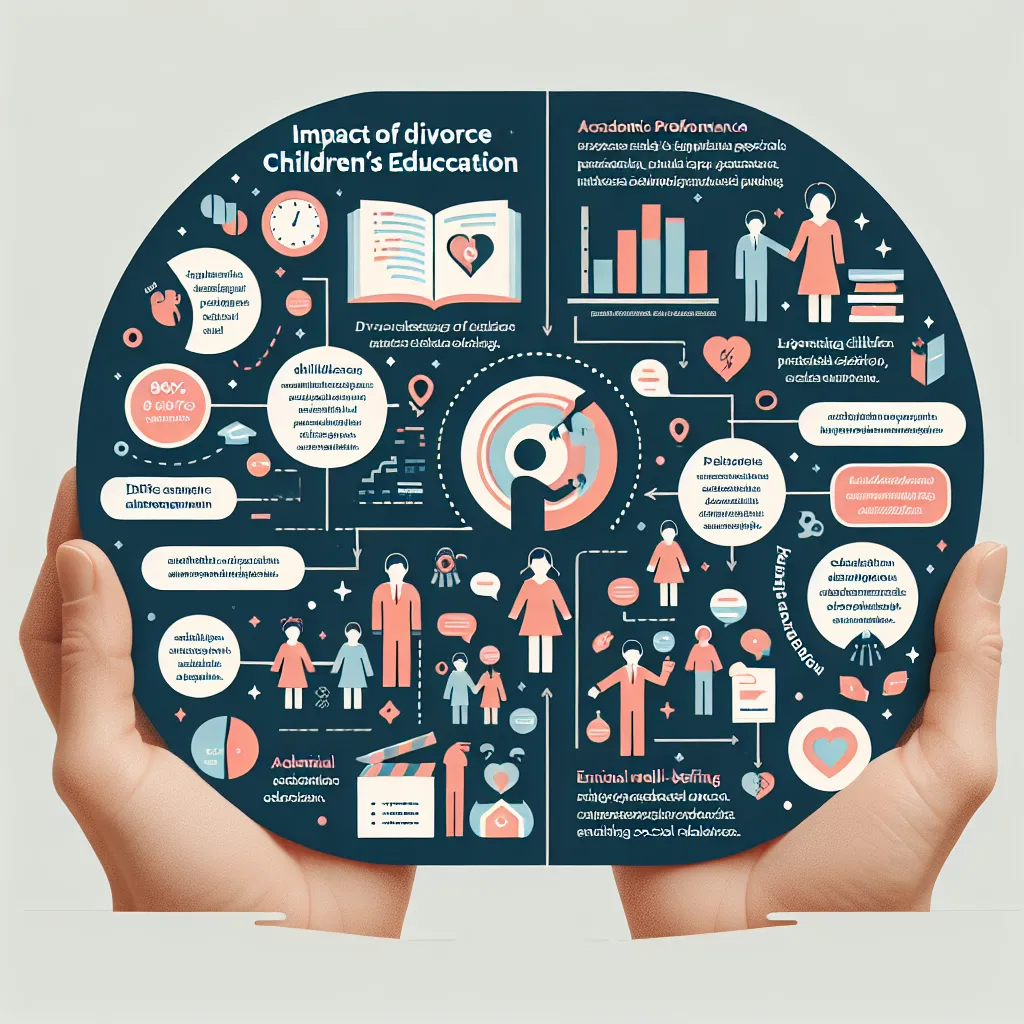The IELTS Reading section is a crucial component of the test, assessing your ability to comprehend complex texts and extract relevant information. Today, we’ll focus on a topic that has been increasingly prevalent in recent years: the effects of divorce on children’s education. This subject has appeared in various forms in past IELTS exams and, given its ongoing relevance in society, it’s likely to resurface in future tests.
Based on our analysis of past IELTS exams and current societal trends, we predict a high probability of encountering passages related to this theme. Let’s dive into a practice exercise that will help you prepare for such a topic while honing your reading skills.
Practice Exercise
Reading Passage
 Effects of divorce on children's education
Effects of divorce on children's education
Divorce has become increasingly common in many societies, and its impact on children’s education has been a subject of extensive research. While the effects can vary depending on individual circumstances, studies have consistently shown that parental separation can have significant consequences on a child’s academic performance and overall educational experience.
One of the primary ways divorce affects children’s education is through emotional distress. The upheaval caused by parental separation often leads to anxiety, depression, and behavioral issues, which can directly impact a child’s ability to concentrate and perform well in school. Children may become withdrawn, act out in class, or struggle to maintain friendships, all of which can hinder their learning process.
Financial strain is another crucial factor. Divorce frequently results in a reduction of household income, which can limit educational opportunities. Families may need to relocate to more affordable areas, potentially leading to a change in schools and disruption of the child’s educational continuity. Limited financial resources may also mean less access to educational materials, tutoring, or extracurricular activities that can enhance learning.
The change in family dynamics can also affect a child’s academic support system. Single parents often face time constraints, juggling work and childcare responsibilities, which may result in less time available to assist with homework or participate in school activities. This reduction in parental involvement can negatively impact a child’s academic motivation and performance.
However, it’s important to note that the effects of divorce on children’s education are not universally negative. In some cases, children from high-conflict marriages may actually show improved academic performance following divorce, as the reduction in familial tension creates a more stable environment for learning. Additionally, many children develop resilience and coping skills that can serve them well in their educational journey and beyond.
Educators and schools play a crucial role in mitigating the negative effects of divorce on children’s education. Awareness of a student’s family situation allows teachers to provide appropriate support and understanding. Schools can offer counseling services, create support groups, and implement programs designed to help children navigate the challenges associated with parental separation.
In conclusion, while divorce can pose significant challenges to children’s education, the outcomes are not predetermined. With proper support from parents, educators, and the community, many children are able to overcome these obstacles and succeed academically. Ongoing research in this area continues to inform best practices for supporting children’s educational needs in the context of family transitions.
Questions
-
Which of the following is NOT mentioned as an effect of divorce on children’s education?
A) Emotional distress
B) Financial limitations
C) Improved technological skills
D) Changes in family dynamics -
According to the passage, children from divorced families may experience difficulty in school due to:
A) Increased intelligence
B) Better concentration
C) Anxiety and depression
D) Higher motivation -
The text suggests that divorce can lead to reduced educational opportunities due to:
A) Increased household income
B) Limited financial resources
C) Better access to tutoring
D) More extracurricular activities -
What role do educators and schools play in helping children affected by divorce?
A) They ignore the children’s family situations
B) They provide counseling and support services
C) They increase academic pressure on the children
D) They discourage parental involvement -
The passage indicates that the effects of divorce on children’s education are:
A) Always negative
B) Always positive
C) Varied depending on circumstances
D) Insignificant in most cases -
In some instances, children from high-conflict marriages may show __ academic performance after divorce.
(Complete the sentence with NO MORE THAN TWO WORDS) -
According to the text, what can single parents struggle with that may affect their child’s education?
(Answer in NO MORE THAN THREE WORDS)
8-10. Choose TRUE, FALSE, or NOT GIVEN for the following statements:
-
All children of divorced parents will inevitably perform poorly in school.
-
Financial strain resulting from divorce can lead to changes in schools for some children.
-
Research on the effects of divorce on children’s education is ongoing.
Answer Key
- C
- C
- B
- B
- C
- improved
- time constraints
- FALSE
- TRUE
- TRUE
Explanations
-
The correct answer is C. The passage does not mention improved technological skills as an effect of divorce on children’s education. The other options (emotional distress, financial limitations, and changes in family dynamics) are all discussed in the text.
-
C is correct. The passage states that “emotional distress” caused by divorce can lead to “anxiety, depression, and behavioral issues,” which can affect school performance.
-
B is the correct answer. The text mentions that divorce often results in “limited financial resources” which can reduce educational opportunities.
-
B is correct. The passage explicitly states that schools can “offer counseling services, create support groups, and implement programs” to help children affected by divorce.
-
C is the correct answer. The text emphasizes that effects vary depending on individual circumstances and are not universally negative or positive.
-
The correct answer is “improved.” The passage states that “children from high-conflict marriages may actually show improved academic performance following divorce.”
-
The correct answer is “time constraints.” The text mentions that single parents often face “time constraints” juggling work and childcare responsibilities.
-
FALSE. The passage does not state that all children of divorced parents will perform poorly. It mentions that effects vary and some children may even show improved performance.
-
TRUE. The text states that financial strain can lead to families relocating, “potentially leading to a change in schools.”
-
TRUE. The conclusion mentions that “ongoing research in this area continues to inform best practices.”
Common Mistakes
When tackling reading passages and questions like these, students often make the following mistakes:
- Overgeneralizing: Assuming that effects mentioned apply to all cases, when the text emphasizes variability.
- Misinterpreting negatives: Failing to recognize when a statement contradicts the passage.
- Overlooking qualifiers: Missing words like “may,” “can,” or “often” that indicate possibility rather than certainty.
- Bringing outside knowledge: Basing answers on personal experience rather than the information provided in the text.
- Rushing through the passage: Not reading carefully enough to grasp nuances and specific details.
Vocabulary
Here are some challenging words from the passage:
- Upheaval (noun) /ʌpˈhiːvəl/ – a major change or disruption
- Resilience (noun) /rɪˈzɪliəns/ – the ability to recover quickly from difficulties
- Mitigating (verb) /ˈmɪtɪɡeɪtɪŋ/ – making less severe or serious
- Predetermined (adjective) /ˌpriːdɪˈtɜːmɪnd/ – decided in advance
Grammar Focus
Pay attention to the use of conditional sentences in the passage. For example:
“With proper support from parents, educators, and the community, many children are able to overcome these obstacles and succeed academically.”
This sentence structure (If/With + condition, result) is common in academic writing to express cause and effect relationships.
Advice for IELTS Reading Success
- Practice active reading: Engage with the text by predicting content, asking questions, and summarizing main points.
- Improve your vocabulary: Regularly learn new words in context to enhance your comprehension speed.
- Time management: Allocate your time wisely between reading the passage and answering questions.
- Skim and scan effectively: Quickly identify main ideas and locate specific information.
- Read the questions carefully: Understand exactly what each question is asking before searching for the answer.
- Use elimination strategy: For multiple-choice questions, eliminate obviously incorrect answers to increase your chances of selecting the correct option.
- Pay attention to transition words: Words like “however,” “additionally,” and “in contrast” can signal important information or shifts in the argument.
- Practice regularly: Consistent practice with various types of texts and question formats will improve your skills and confidence.
Remember, success in IELTS Reading comes from a combination of strong language skills, effective test-taking strategies, and familiarity with the exam format. Keep practicing, and you’ll see improvement in your reading speed, comprehension, and overall performance.


